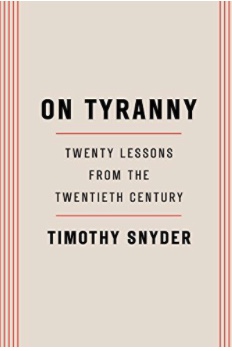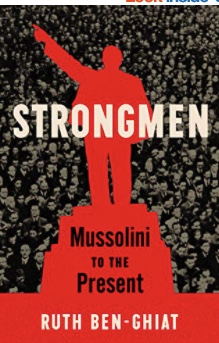From beginning to end ~ Tyranny & Strongmen
- amylsommers
- Dec 1, 2020
- 4 min read
Updated: Dec 1, 2020
With the thorough thumping delivered at the end of November by Republican-appointed justices in the Third Circuit, Trump's litigation-driven attempted coup has apparently collapsed.
Cue: sigh of relief.
Democracy's guardrails have -- barely, and with plenty of buckling -- held. Critically, it was not Republican elected officials at the federal level who played a role in stopping Trump. If anything, they added fuel to his tank (we see you Senator Graham). No 21st century Joseph Welch ever appeared to challenge Trump's cruelty, venality and destructiveness.
Ultimately, it was state and local election officials, and state and federal judges, who did not allow their Republican affiliation to distort their duties, that prevented Trump from jettisoning millions of votes to secure a 2020 win.
That the guardrails of American democracy held -- barely -- demands our consideration. Just today Jochen Bittner has a sobering piece in the New York Times about the lessons of Germany's loss in WWl and the resulting 'stab-in-the-back' legend:
Think Trump's 'stop the steal' slogan is merely another attempt at huckster-driven fundraising?
Bittner notes
"A staggering 88 percent of Trump voters believe that the election result is illegitimate, according to a YouGov poll. A myth of betrayal and injustice is well underway." (emphasis added)
So, yes, we can breath a sigh of relief that Trump will not have another term to continue dismantling American democracy. Yet, almost 74,000,000 Americans were willing to see him continue his enterprise. And, as Bittner notes, 88% of them think Trump's defeat was illegitimately achieved.
That means 65,091,840 of us are susceptible to the 21st century Trump version of the 'stab-in-the-back' legend. What to do?
At the beginning of the Trump era, Timothy Snyder's "On Tyranny: Twenty Lessons from the Twentieth Century" became my roadmap. I took seriously the lessons he derived from his study of Central European authoritarianism of the 30's-50's. The importance of the judiciary as an institution,
the importance of simple things like making personal connections with one another and of valuing professional ethics (if you're a lawyer, the lesson of the Trump era is to aspire to have the ethics of a Walter Shaub, not a Rod Rosenstein). In 2018, I had the pleasure of hearing Snyder speak. When he told the audience that America stood in April 2018 as Germany in 1933 before the Reichstag fire. I believed him. I still do. We came too terribly close to falling into the abyss.
As we approach the end of the Trump term, the bookend to Snyder's On Tyranny is Ruth Ben-Ghiat's just published "Strongmen: Mussolini to the Present." Like Snyder, Ghiat's research expertise is in European authoritarianism. She traces the strongman tradition from Mussolini up to present-day iterations like Erdogan, Putin and Trump.
Her conclusions about the end of strongmen regimes merit the same attention as Snyder's on surviving authoritarian-tending eras. Because it isn't enough that American democracy has survived -- for now. We need to consider how to revive, nourish and strengthen it for the future.
Ben-Ghiat notes that understanding "the how" strongmen achieved power is vital to successfully opposing such efforts. Her list of "ingredients" is sobering:

If we want to avoid Trump's defeat turning into the corrosive acid that makes possible a resurgence of another authoritarian candidate in 2024 or 2028, we need to recognize that in a period of social change, the still-resonate power of messages on virility, charisma, male authority and 'traditional values.' George Lakoff has written extensively about how the framing of political messaging both derives from our world views, and can be used to shape our understanding of events. We can expect that GOP electeds will continue to deploy the messages that Trump used so successfully to garner support for their own attempts to win national election. In so doing, they will also use fears about social change to discredit Biden and the Democrats. Democrats would be wise to heed Lakoff's lessons.
Ben-Ghiat also notes the importance of accountability. In achieving and holding power, strongmen depend on blame of 'the other' to galvanize support and weaken the opposition. Accountability is what strongmen avoid above all else because it would reveal the lie of their hate-filled rhetoric.

Accountability builds confidence in institutions (back to Snyder who told us how important cherishing our institutions would be) and creates expectations about how future wrongdoers will be treated should they choose to transgress laws and norms.
Note, accountability is not just about using prosecutorial power or Congress's investigative powers. Commercial parties also have a role in accountability. America's banks and professional firms (law, accounting, consulting, lobbying) have long played powerful parts in enabling and amplifying strongmen.

What if major corporations were to hold their legal, accounting and financial services providers accountable for their choices during the Trump era? Rod Rosenstein, chief implementer of the family separation policy that resulted in 666 babies and children being permanently wrenched from their families, has landed at King & Spaulding. He made a choice as a prosecutor. King & Spaulding made a choice in hiring him -- wagering that his addition to their roster will attract fee paying work. What if companies make a choice that they don't want an ethically-deficient lawyer representing their important and sensitive business interests?
As Ben-Ghiat notes, anticorruption is vitally important to preserving confidence in rule of law and societal cohesion. The brazen violation of the Hatch Act and ethics and disclosure standards by Trump Administration appointees has been relentless and destructive. We need to recognize the dangers of such behavior and prioritize compliance with standards developed over the past century to foster honesty in government.
That Trump has been defeated is cause for celebration.
That even more Americans voted for him in 2020 than in 2016, knowing what he had done in the intervening four years, and now believing he was unjustly deprived of a second term, is cause for vigilance.
If you believe history has relevance for current events, and I do, Snyder and Ben-Ghiat have warned of the precipice we stand on. We would be wise to heed them so that we don't fall in.











Comments